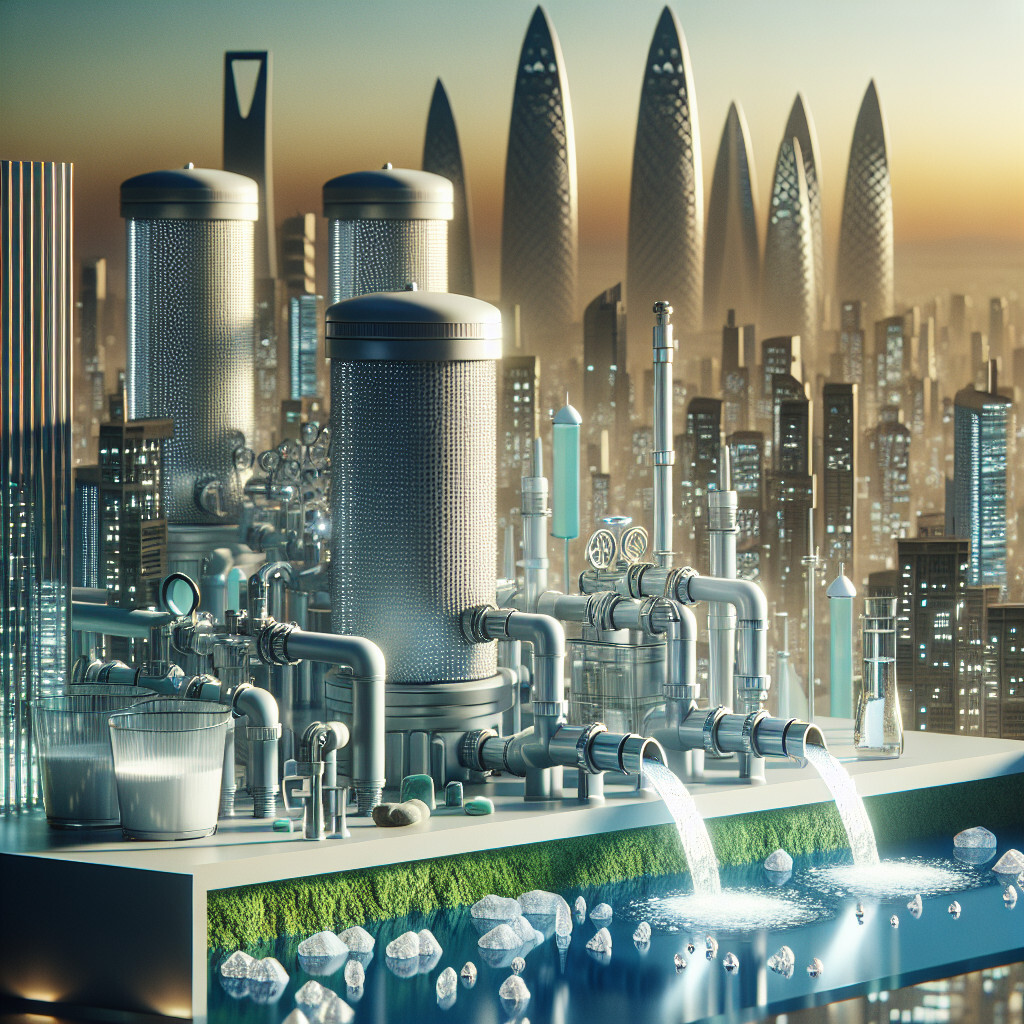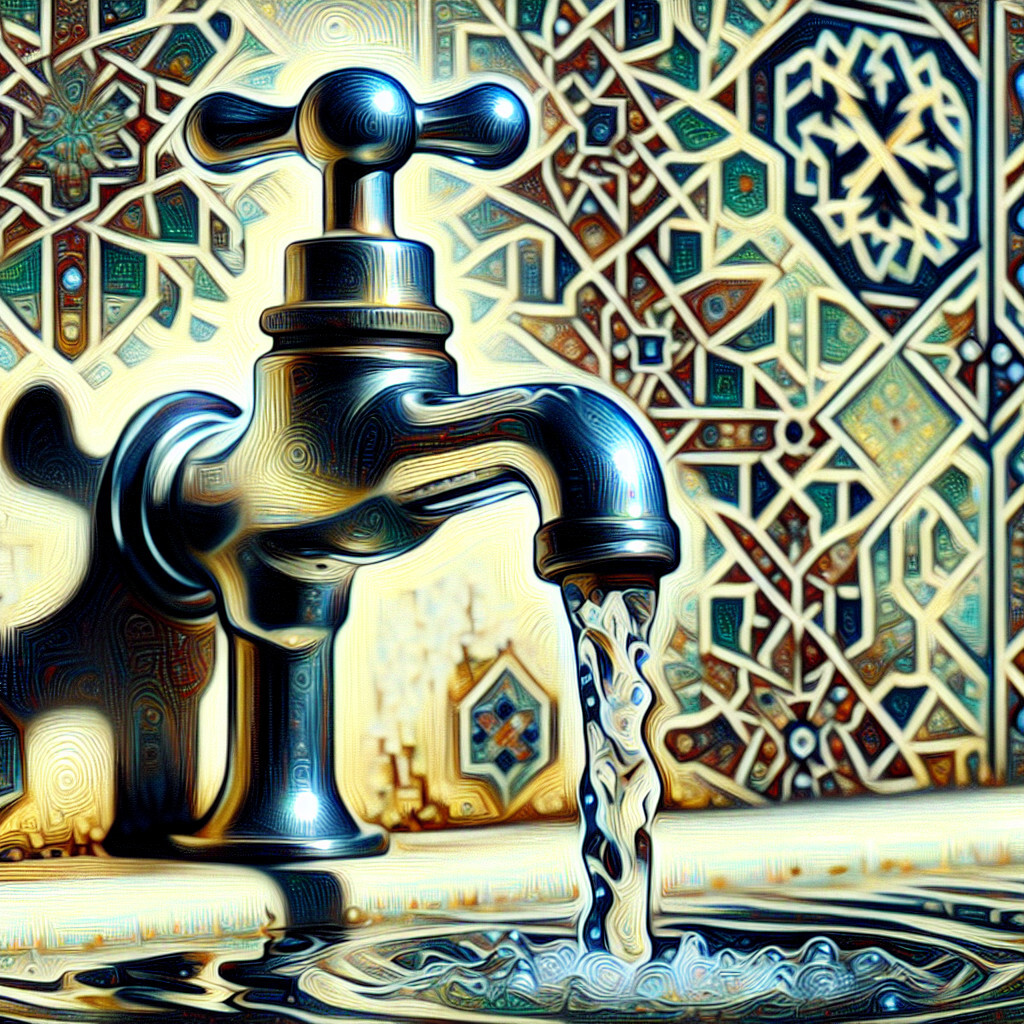-
Table of Contents
“Saudi Arabia’s Tap Water: A Blend of Desalination and Treatment for Safe Consumption.”
Introduction

Tap water in Saudi Arabia is generally considered safe to drink, but most residents and visitors prefer to consume bottled water due to concerns about water quality. The country’s tap water is primarily sourced from desalination plants that process seawater from the Persian Gulf, the Red Sea, and underground wells. Despite rigorous purification processes, the taste and mineral content of the water can vary, leading to a preference for filtered or bottled water. Additionally, the quality of tap water can be affected by the condition of the pipes in some buildings, further contributing to the reliance on alternative sources for drinking water.
Understanding the Quality of Tap Water in Saudi Arabia
Understanding the quality of tap water in Saudi Arabia is a topic of interest for both residents and visitors alike. As a desert nation, Saudi Arabia faces unique challenges in water supply and quality. The country relies heavily on two main sources for its water: desalination of seawater and underground water reserves. However, the question remains: how safe is the tap water in Saudi Arabia?
Saudi Arabia is home to the largest desalination plant in the world, producing more than a million cubic meters of water per day. This process involves removing salt and other impurities from seawater, making it safe for human consumption. The desalinated water is then mixed with treated underground water and distributed to households and businesses across the country.
However, despite the rigorous treatment process, the quality of tap water can vary across different regions of Saudi Arabia. In major cities like Riyadh and Jeddah, the tap water is generally considered safe to drink. The water undergoes stringent testing and treatment processes to ensure it meets the World Health Organization’s standards for drinking water.
Nevertheless, it’s important to note that the taste of the tap water may not be appealing to everyone due to the high mineral content resulting from the desalination process. This has led many residents and visitors to opt for bottled water, which is widely available and relatively inexpensive in the country.
On the other hand, in more remote areas of Saudi Arabia, the quality of tap water can be less reliable. These areas often rely on underground water reserves, which can contain higher levels of salinity and other impurities. While this water is treated before distribution, the treatment processes may not always be as thorough or as regulated as in the larger cities. Therefore, in these areas, it is often recommended to drink bottled water or use a home water filtration system.
Moreover, the quality of tap water in Saudi Arabia can also be affected by the condition of the water supply infrastructure. In some older buildings and neighborhoods, the water pipes may be old and corroded, which can potentially contaminate the water. Therefore, it’s advisable to have the water quality tested if you’re living in an older building or if you notice a change in the taste, smell, or color of your tap water.
In conclusion, while the tap water in Saudi Arabia’s major cities is generally safe to drink, the taste and quality can vary depending on the region and the condition of the local water supply infrastructure. For those who are concerned about the quality of their tap water, using a home water filtration system or opting for bottled water are viable alternatives. As always, when in doubt about the safety of your water, it’s best to consult with a local health or water authority.
The Journey of Tap Water: From Source to Household in Saudi Arabia
In the arid expanses of Saudi Arabia, the provision of clean, potable tap water is a feat of engineering and resource management. The journey of tap water from source to household in Saudi Arabia is a fascinating process, involving a complex network of desalination plants, pipelines, and treatment facilities.
Saudi Arabia, being a desert country with scarce freshwater resources, relies heavily on desalination, the process of removing salt and other impurities from seawater, to meet its water needs. The country is home to some of the world’s largest desalination plants, which are primarily located along the Red Sea and the Arabian Gulf. These facilities convert millions of cubic meters of seawater into fresh water every day, a process that is both energy-intensive and technologically advanced.
Once the seawater is desalinated, it is then treated to ensure it is safe for human consumption. This involves the addition of certain chemicals to kill any remaining bacteria or viruses, and to adjust the water’s pH level to prevent corrosion in the pipelines. The water is also filtered to remove any remaining solids. The result is clean, clear water that meets the World Health Organization’s standards for drinking water.
The treated water is then pumped into a vast network of pipelines that crisscross the country, reaching even the most remote areas. These pipelines are constantly monitored for leaks and other issues to ensure the water remains clean and safe as it travels to households. In some cases, the water may be stored in reservoirs or tanks before it is distributed to consumers.
Once the water reaches households, it is typically stored in rooftop tanks. These tanks are cleaned and disinfected regularly to prevent the growth of bacteria and other harmful organisms. The water is then piped into homes, where it is used for drinking, cooking, bathing, and other domestic purposes.
Despite these rigorous processes, the quality of tap water can vary across different regions of Saudi Arabia. In some areas, the water may have a slightly salty taste due to the desalination process. There have also been reports of tap water being discolored or having an unusual smell, which can be due to a variety of factors, including the quality of the original seawater, the effectiveness of the treatment process, and the condition of the pipelines and storage tanks.
To ensure the safety of the tap water, the Saudi government conducts regular testing and monitoring. Consumers are also advised to boil tap water before drinking it, especially if they are in an area where the water quality is known to be variable.
In conclusion, the journey of tap water from source to household in Saudi Arabia is a complex process that involves desalination, treatment, and distribution. Despite the challenges, the country has been successful in providing clean, safe water to its residents, even in the harsh desert environment. However, ongoing efforts are needed to maintain and improve the quality of the tap water, to ensure it remains safe and suitable for all uses.
Health Implications of Consuming Tap Water in Saudi Arabia
In the arid kingdom of Saudi Arabia, the question of water quality is of paramount importance. The country’s geographical location and climatic conditions make it one of the most water-scarce nations in the world. As such, the quality of tap water and its potential health implications are subjects of great concern for both residents and visitors.
Saudi Arabia’s tap water primarily comes from two sources: desalinated seawater and underground wells. The country is the largest producer of desalinated water in the world, accounting for about 50% of its drinking water supply. This process involves removing salt and other impurities from seawater, making it safe for human consumption. However, the desalination process also removes essential minerals like calcium and magnesium, which are naturally present in freshwater. The absence of these minerals in desalinated water can lead to health issues such as heart disease and bone disorders over prolonged consumption.
On the other hand, water from underground wells, which accounts for the remaining 50% of the country’s drinking water supply, is not without its own set of problems. This water is often high in fluoride due to the natural geological formations in the region. While fluoride is beneficial for dental health in small amounts, excessive consumption can lead to dental fluorosis, a condition that causes discoloration and damage to the teeth. Moreover, high levels of fluoride can also lead to skeletal fluorosis, a debilitating condition that affects the bones and joints.
Furthermore, the water distribution system in Saudi Arabia has been a subject of concern. The country’s hot climate can cause the water in the distribution pipes to heat up, promoting the growth of harmful bacteria. Additionally, the pipes are often old and corroded, leading to the contamination of water with heavy metals such as lead and copper. These metals can have serious health implications, including neurological damage and kidney disease.
Despite these issues, it is important to note that the Saudi government has taken significant steps to ensure the safety of its tap water. The Saudi Standards, Metrology and Quality Organization (SASO) regularly monitors the quality of tap water and enforces strict standards for water treatment and distribution. The government has also invested heavily in improving the country’s water infrastructure, including the replacement of old pipes and the construction of new desalination plants.
However, many residents and visitors still prefer to drink bottled water due to concerns about the quality of tap water. While this is a personal choice, it is worth noting that bottled water is not necessarily safer than tap water. In fact, several studies have found that bottled water can also be contaminated with bacteria and chemicals due to poor storage conditions and the use of plastic bottles.
In conclusion, while there are potential health implications associated with consuming tap water in Saudi Arabia, the government has made significant efforts to ensure its safety. It is advisable for individuals to stay informed about the quality of their local water supply and to consider using water filters or boiling tap water as additional safety measures. Ultimately, the choice between tap water and bottled water should be based on personal preference and an understanding of the potential risks and benefits associated with each.
The Role of Desalination in Providing Tap Water in Saudi Arabia
In the arid kingdom of Saudi Arabia, the provision of tap water is a feat of engineering and innovation. The country, known for its vast deserts and scarce rainfall, has had to devise ingenious methods to ensure a steady supply of potable water for its growing population. One of the most significant strategies employed by the Saudi government is desalination, a process that transforms seawater into freshwater, making it suitable for human consumption and irrigation.
Desalination plays a pivotal role in providing tap water in Saudi Arabia. The country is home to a coastline that stretches over 2,400 kilometers along the Red Sea and 800 kilometers along the Arabian Gulf. This geographical advantage has been harnessed to establish numerous desalination plants, which are instrumental in meeting the country’s water needs. In fact, Saudi Arabia is the largest producer of desalinated water in the world, accounting for approximately 20% of global production.
The process of desalination involves removing the salts and other minerals from seawater, rendering it safe for consumption. This is typically achieved through two main methods: multi-stage flash distillation (MSF) and reverse osmosis (RO). MSF involves heating seawater in multiple stages to create steam, which is then condensed into freshwater. On the other hand, RO uses high pressure to force seawater through semi-permeable membranes, separating the salts and other impurities from the water.
Saudi Arabia’s reliance on desalination has grown over the years due to several factors. Firstly, the country’s natural freshwater resources are limited and are being rapidly depleted due to over-extraction. Secondly, the country’s population and economy have been growing at a rapid pace, leading to an increase in water demand. Lastly, climate change has exacerbated the water scarcity issue, making it even more crucial to find sustainable water sources.
However, while desalination has been a game-changer in providing tap water in Saudi Arabia, it is not without its challenges. The process is energy-intensive, contributing to high carbon emissions. It also produces a brine byproduct, which if not managed properly, can harm marine ecosystems. To address these issues, the Saudi government has been investing in research and development to make the desalination process more efficient and environmentally friendly. For instance, they are exploring the use of renewable energy sources, such as solar and wind power, to run desalination plants.
Moreover, the government is also implementing stringent regulations to ensure the quality of the desalinated water. Regular testing is conducted to monitor the levels of salts, minerals, and other potential contaminants in the water. This ensures that the tap water provided to households and businesses is not only safe for consumption but also meets the international standards for drinking water.
In conclusion, desalination plays a crucial role in providing tap water in Saudi Arabia. Despite the challenges, it has proven to be a viable solution to the country’s water scarcity issue. With continued investments in technology and stringent quality control measures, Saudi Arabia is set to continue leveraging desalination to meet its water needs, ensuring a reliable supply of tap water for its residents.
Q&A
1. Question: Is tap water in Saudi Arabia safe to drink?
Answer: Generally, it is not recommended to drink tap water in Saudi Arabia due to concerns about water quality. Most residents and visitors prefer to drink bottled water.
2. Question: How is the tap water in Saudi Arabia treated?
Answer: Tap water in Saudi Arabia is treated through desalination processes, which remove salt and other impurities from seawater. However, the quality can vary depending on the location and the treatment facility.
3. Question: What is the main source of tap water in Saudi Arabia?
Answer: The main source of tap water in Saudi Arabia is desalinated seawater, due to the country’s lack of freshwater resources.
4. Question: Are there any health risks associated with drinking tap water in Saudi Arabia?
Answer: While the tap water is treated, there can be inconsistencies in the quality depending on the location. Therefore, it’s possible to experience minor gastrointestinal issues if you’re not used to the water. Long-term consumption could potentially lead to more serious health problems due to the high salt content in desalinated water.
Conclusion
The tap water in Saudi Arabia is generally considered safe to drink, but its taste or quality may not be as high due to desalination and chlorine treatment. Therefore, many residents and visitors prefer to drink bottled water or use water filtration systems.






